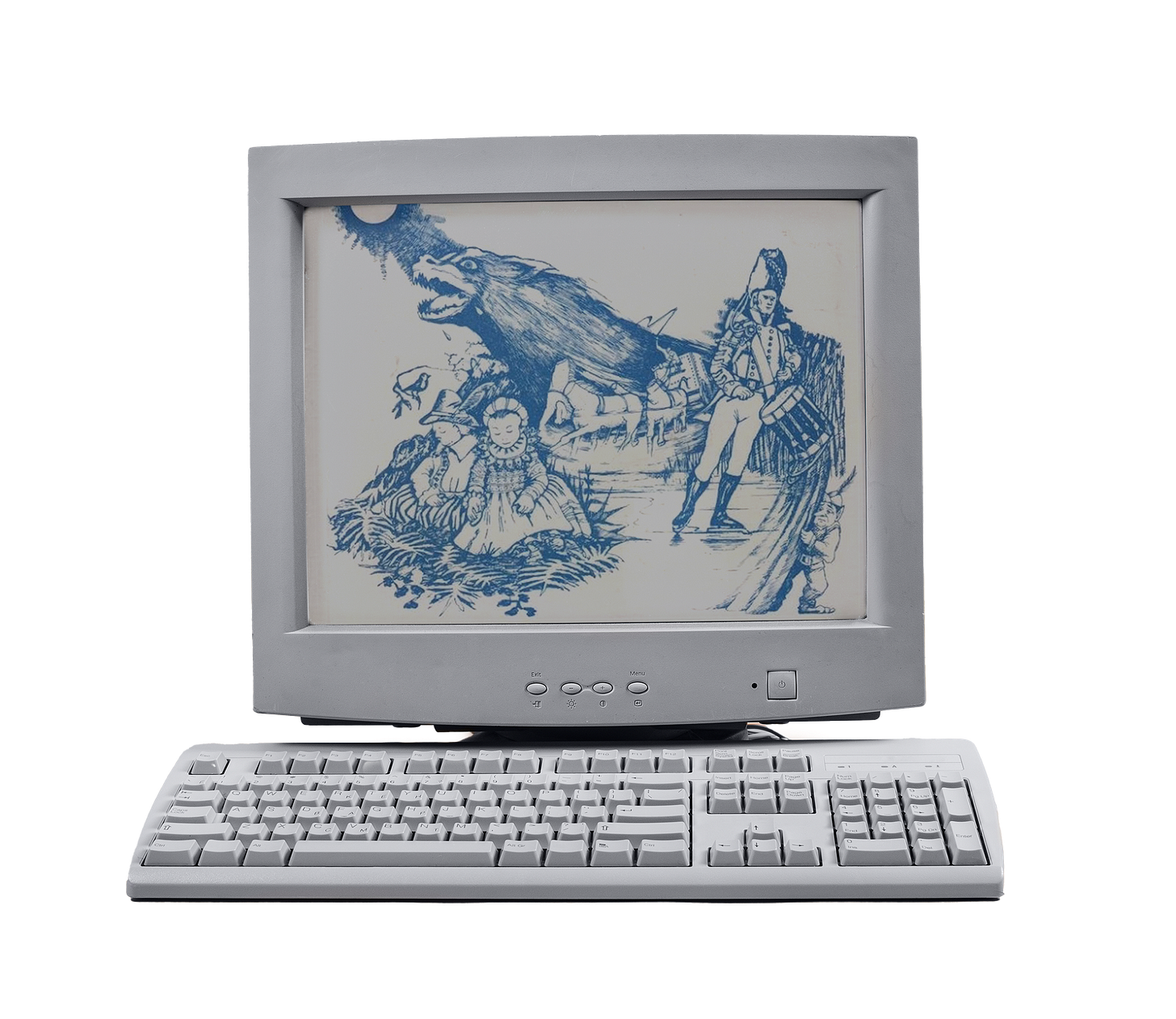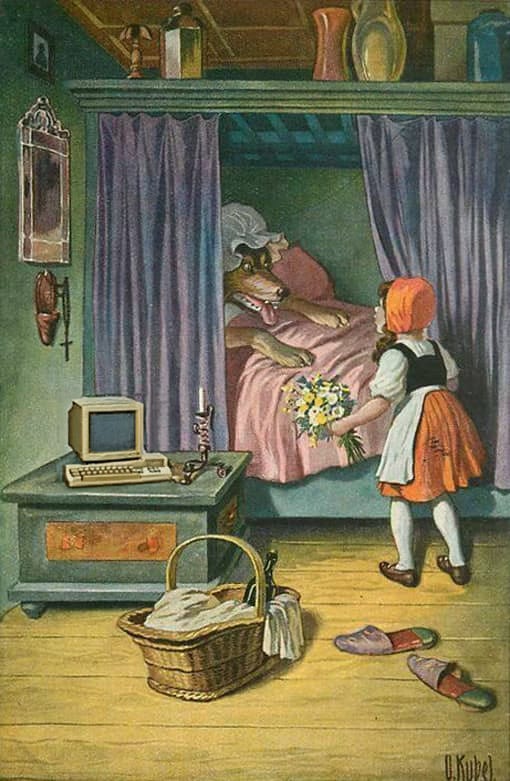The Spirit in the Blue Light
Sheila Heti looks to folktales to understand her relationship with her computer.
Do you know the Aarne-Thompson-Uther Index, a classification system for European folktales? It was first compiled in 1910 by a Finnish man named Antti Aarne, and it was his attempt to group folktales by plot and motif. For instance, Type 311 is Rescued by the Sister. Type 325 is The Magician and His Pupil. There are also types of fable that can be classified with others that tell of The Maiden Without Hands (706), The Girl as Wolf (409), and The Girl as Flower (407). The entire index ends at Type 2004 with Pulling Up the Turnip.
An American folklorist (Stith Thompson) and a German folklorist (Hans-Jorg Uther) expanded it, translated it, and made revisions, bringing the index to its completion in 2004.
Lately, I have been thinking a lot about Type 562, The Spirit in the Blue Light, since I spend most of the day captivated by a spirit in a blue light: my computer. Often when I’m feeling muddled, I go to my computer and clean up my files, or classify miscellaneous documents, or trash things, feeling a bit like I imagine Aarne, Thompson and Uther felt as they tried to bring order to the orderless jumble that lay before them. In my case, it is not a history of folk storytelling, but years of thinking, shopping, corresponding, bill-paying, news-reading, and idle fantasizing, as though my computer really is my mind, externalized, or an apartment which needs cleaning, or contains all the stories that have ever been told. It’s as if the spirit in the blue light of my computer and the spirit inside me at some point joined hands, and my eternal spirit is now more comfortable when it is joined with the spirit of this digital blue light, than it ever again will be—alone or apart from it.
I wondered at one point whether the narrative of a Spirit in the Blue Light fable could give me some insight into what increasingly felt like an essential relationship, or an extension of myself, or this need I had to be with my computer almost continuously throughout the day. Here is what I read:
A wounded and wandering soldier encounters a witch in a forest. He asks her if she could provide him with lodging. She agrees to put him up if he’ll help around the house. For two days he helps her, and for two nights he sleeps. On the third day, the witch asks him to fetch her the blue light that is shining at the bottom of her empty well. When the soldier climbs down and reaches the bottom, he realizes he is trapped there. To calm himself—and to think more clearly about his situation—he decides to have a smoke. He notices a matchbox lying on the ground, a blue light glinting off from one of its sharp corners. Striking the match, he lights his pipe. Suddenly, a spirit emerges in the smoke of the blue flame! This spirit tells the soldier that he will grant him three wishes. First, the soldier asks that the witch be killed. She is, and the soldier climbs from the well and runs free. Then the soldier asks to have brought to him the princess of the land, to serve as his maid. The princess is brought and begins sweeping up, doing the chores that the soldier had been doing. The king, furious at learning that a lowly soldier is using his daughter in this way, has him captured. Right before the soldier is executed in the centre of the town square, the soldier asks if he might have a final smoke. His request is granted, and he lights his pipe with the match from the witch’s matchbox, and the blue spirit reappears! The soldier asks it to kill all the citizens in the square, giddy with the anticipation of witnessing his hanging, and the spirit kills them all. Fearing for his life, the king surrenders himself, and gives the soldier his entire kingdom, and his daughter as a bride.
At first glance, it is not clear that this story has anything to say about my relationship with my computer.
In the Arne-Thompson-Uther index, The Spirit in the Blue Light fables fall within the category, Magical Object Provides a Supernatural Helper. This is a sub-class of Tales of Magic stories. (There are only six other main classes of story: Animal Tales, Religious Tales, Realistic Tales, Formula Tales, Tales of the Stupid Ogre, and Anecdotes and Jokes.)
My computer, then, is not an animal, not something realistic, not a stupid ogre—but a magical object, and the applications within it—Word, Gmail, Excel—are supernatural helpers. I guess it is something of a supernatural helper who can connect you with friends across the world or disappear three hundred of your dollars on a red dress that seems perfect and soon arrives at your door but doesn’t fit you at all. I guess it is a supernatural helper that can give you glimpses into the sufferings of humans hundreds of thousands of miles away. I guess it is a supernatural helper that can write your college essay on Robespierre, or a difficult letter to an unfaithful husband, finally asking for a divorce.
Yet the supernatural helper helped the soldier by enslaving an innocent princess, and killing a witch, and everyone in the square. If the soldier hadn’t encountered the Spirit in the Blue Light, there at the bottom of the well? He would have sat there, really bored. He might even have died there.
The soldier didn’t do anything particularly bad to deserve to end up at the bottom of the well. He was just hobbling around wounded, without a home. Yes, he asked the witch for lodging, but he was willing to work for the lodging, and did. Maybe this was a mistake—we can ask the wrong people for help, then find ourselves stuck, as if at the bottom of a well. He started out as the weak one, the underdog, but as soon as he had the opportunity, he made himself much worse than the one who oppressed him. Yes, the witch put him in the well, but she didn’t actually kill him. The soldier ended up doing much worse. He could have wished, sitting there in front of his computer, the Spirit of the Blue light ready to do his bidding, not to dominate or kill anyone; he could have wished for something other than money and power—the kingdom and a concubine, to boot. He could have wished for his leg to be healed, and to be taken to his home to recover in peace; or for the witch to see the error of her ways, and not trap anyone else down there. He could have wished to win a wife who loved him. He could have wished for anything.
What are my wishes as I sit before my magical object, as I sit here with this supernatural helper, this radiating blue light? Are my wishes any worthier than those that the soldier made? To be saved, I guess, which sometimes means to be turned on, sometimes means to be distracted by a puppy, sometimes means to find a nice dress, sometimes means to hear from a friend. Maybe some of these wishes are all right.
But if every time I sit before the computer, it is a kind of prayer—it is the lighting of a match, a summoning of the blue light, and wishing—then how worthy are my prayers? Turning on my computer, it is a prayer and a collaboration both; it is always a wish in a Tale of Magic. Maybe there was a time when my computer was just a word processor, something other than a supernatural helper. My thinking about my computer still lags behind, lags behind with what my computer was in the 1980s. I have to make my thinking about it more current. I have to classify what it is better.
*Part two of this series, The History of the Personal Computer, will be published next week.






How much did I love this? Smart, informative, thoughtful and made me hungry to read more. Way to go.
As a folklore and tale enthusiast, I have enjoyed this post. It isn't simple to either locate or allocate a folk tale, as is indicated. Cross referencing is probably even harder!